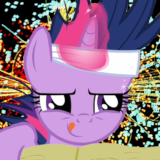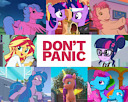Science and fiction—thoughts on the value of getting the physics right · 4:27pm Aug 31st, 2014
While finalising Twilight's Sputnik, I got thinking about all the fiction I have read which involves some sort of stargazing. One which came to my mind was Isaac Asimov's classic short story Nightfall, a tale of an alien world which is only plunged into darkness once every 2000 years or so during an eclipse (I guess that's a sort of Nightmare Moon). On realising that I didn't have a copy of this classic on my bookshelf, I promptly placed an order for an Asimov anthology with some random used-book dealer, which—economy delivery from a distant land—arrived in my pigeon hole last week.
Dr Asimov was a far cleverer writer than I am, and this story is widely regarded as one of his best, a classic from the Golden Age of Science Fiction.
[1] I spent a while trying to figure out if it possible to have a stable system with so many bodies, so that every sun is sufficiently bright to mask the distant stars? I think the answer is no—the star the planet orbits would appear as the sun, and the others would just be bright stars—if they get too close, the orbits would interfere and the system becomes unstable. Unless the more distance stars were really really bright, but is that astrophysically possible? And how could such a system form? Maybe at this point I should just suspend my disbelief and go along with the story... But I couldn't help speculating that a more plausible scenario would be a planet with one hemisphere locked facing the star it orbits (as the same side of the moon always faces the earth), so that side is always illuminated (until something gets in the way).
I don't generally think of my stuff as Science Fiction, as the way I see it, SF is starting from science, then going off some fantastical tangent to create fiction; whereas my style is starting from a fantasy world of talking ponies, and adding discussion of science. Different perspective—but you could say the end result is often much the same. But on rereading Nightfall I felt a certain affinity with Asimov due to the effort he puts into getting the details of the physics right. He explains the inverse-square law of gravitational attraction, and the principle of an eclipse—making his 'moon' several times the apparent diameter of the 'sun' so it casts a shadow over an entire hemisphere of a planet for several hours. He is vague on the details of his planet-with-six-suns, possible because when you try to figure out the details, it starts to look less plausible.[1]
Far less plausible is the uncanny similarities between his 'alien' society and that of mid 20th century America. But of course, to flag that as a mistake, would miss the point. The story is not a serious consideration of what an alien society would be like, it's a speculation of what would happen in a society like our own, if nightfall only occurred once every two millennia.
Like Asimov, I try to get the details of physics in my stories accurate (ignoring the trivial matter of talking, flying, magic-working ponies walking on clouds and all that). So when writing Twilight's Sputnik, I worked through quite a few calculations to satisfy myself that my description of satellite obits was believable. I spent a while trying to determine if the rock Twilight threw upwards would burn up a shooting star really before it hit the ground, and decided that if I was sufficiently vague about its size, then it was within the realm of possibility. Would the orbiting rocks reflect enough sunlight to be visible from the ground? Add a sentence to explain that they were polished to be reflective, and that ponies have superior vision due to their hoof-sized pupils, and it becomes okay.
Similarly when writing The Art of Rainbow Engineering, I was careful to describe the weather, and the relative positions of the sun, clouds and rainbows in a consistent way. I'm not saying there aren't any mistakes, but I do try to get it right.
Does any of this matter? To me it does. But if I put my personal fetishes aside, does it actually make it a better story? I'm sure that some readers do appreciate these details, but most probably don't care, or even notice. And why should it matter when we are writing about a fairytale land of magical ponies?
But I believe that at a subconscious level, it does make for a better story, as by keeping to my rules, I construct a more consistent and believable universe, than I would otherwise make. Of course this is me—it doesn't necessarily apply to other stories or other writers.
As a writer, you need to have confidence in your own imaginary world. If you don't believe in it, then you have little chance of convincing your readers. This is no-doubt why writers of historical fiction spend so much time researching the trivia of the periods they write about; why the Star-Trek script writers commissioned a Klingon dictionary and grammar; and why Tolkien ensured that references to the phase of the moon in the Lord of the Rings are consistent. You have to keep your own rules, even if you break others.





I, for one, greatly appreciate your commitment to scientific accuracy even in the face of the reality hacks that are pony magic. Not only are you educating your readers, you're also making Equestria feel more real, which is never a bad thing. So thank you for sweating the small stuff.
My perspective is that it is a matter of judging what is important to the story as to which laws of reality should be carefully applied and which can be skimmed over. E.g. for me it is very important for Equestria's economics to be logical if cartoonish, whereas I will have it be a full moon every night if drama calls for it (We can always chalk it up to Nightmare Moon and her evil shenanigans).
But some of those readers who don't notice when it's done well will notice when it's done wrong. Not everyone cares about the physics. But even those who do probably don't really notice when it's done right. They will, however, notice when it goes wrong. It's kind of like utilities: very few people find anything remarkable about a practically unlimited amount of electricity and clean water coming into their homes, but they sure notice when one of those stops.
2416966 Exactly. Scientific correctness gives me a subconscious warm fuzzy feeling, but incorrectness drags me right out of the story like having a bucket of ice water dumped on my head. Fortunately (or unfortunately, for those of us who like some science in our science fiction), scientific accuracy is rarely a factor in horse words. Legal systems, on the other hoof - I don't think I've seen a single courtroom scene on this site that hasn't made me want to grab the author by the collar and scream into their face "the law can't work that way!" Usually quickly followed by me closing that browser window and reading something else.
Also:
Now you have me wondering if I can remember how to calculate the diffraction-limited resolution of an optical system with a hoof-sized aperture...
2417119
Oh Celestia, the court scenes. The best way I've ever seen for a non-lawyer to handle a court scene was in Ra (non-pony, but heartily recommended: qntm.org/ra). There was a reasonably lengthy talk with a lawyer, and then:
(Not a spoiler, since it's not even close to the focus of the story)
I think more ponyfic authors ought to take a page out of Sam's book when it comes to writing courtroom scenes, and skip it.
"I'm sure that some readers do appreciate these details, but most probably don't care, or even notice."
Well, regarding these particular stories, the people who don't care or notice probably aren't reading them.
I do think, though, that it is very, very important to have a consistent universe. A hole in the universe is a hole in the story.
If a world is tidally locked, the inhabitants could travel to the cold perpetual night. We need multiple lightsources to have no night:
Well now, the bright stars causing so much light pollution to prevent night is plausible, but only barely:
Let us suppose that we have stars with high absolute magnitude more than a lightyear away but less than a parsec, it could work. Let us look the orientation of the stars:
If we have 2 stars on opposite sides of Lagash, one would have a twilightzone. With 3 stars arranged equiangularly on a plane, one has 2 twilightzones. If we have 4 stars arranged equiangularly like a tetrahedron, we have no twilightzones. The probability of 5 stars arranged like a tetrahedron is low so, through in a 5th star for the sloppy arrangement of stars with the 6th star being the primary.
The lack of light on Lagash is plausible, but just barely. The superior planet with such low albedo that it cannot be seen which blocks 1 star when it the only star in the sky only every 2049 years seems implausible.
If the 5 stars have apparent luminosities of 1% to 5% of the apparent luminosity of the primary of Lagash, with a combined apparent luminosity of the 5 stars of 10% of the apparent luminosity of the primary of Lagash, the lightpollution would destroy the night.
Frozen West is a story about what would have happened if the Mare in the Moon, NightMareMoon would have won at the end of Friendship is Magic Part # Ⅱ:
The Frozen West
It is a Sad Dark Tragic story set thousands of years in the future on an alternative Equus in al alternate timeline with 1 side in eternal daylight and the other in eternal night. Less than 10% of Equus is habitable with less than 1% the population of sentient sapient beings Equus had at the time of the return of the Mare in the Moon, NightMareMoon. Equestria is entirely on the nightside. Equestria is frozen, Only 1 being survives in the entire Princessipality of Equestria —— ¡a mad black alicorn!